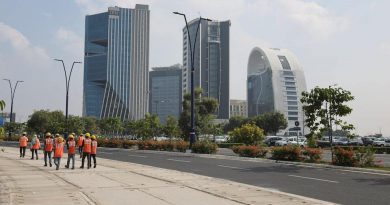Malaysia’s King Visits SAMI Alsalam Aerospace Industries to Strengthen Aviation and Space Cooperation
Riyadh – Malaysia’s King Sultan Ibrahim Sultan Iskander visited SAMI Alsalam Aerospace Industries in Riyadh on Wednesday, marking an important step in enhancing cooperation between Saudi Arabia and Malaysia in the rapidly growing aerospace and aviation sectors.
The visit emphasized the shared vision of both nations to advance industrial capabilities, technology transfer, and innovation in aerospace systems while aligning with sustainable development goals and Vision 2030.
During his visit, the Malaysian King was accompanied by Saudi Minister of Tourism Ahmed Al-Khateeb. The delegation toured the company’s state-of-the-art facilities and was briefed on SAMI Alsalam’s extensive expertise in aircraft maintenance, repair, and overhaul services.
These capabilities have positioned the company as one of the leading entities in the region, driving forward Saudi Arabia’s ambition to localize and expand its aerospace and defense industries.
SAMI Alsalam Aerospace Industries, a subsidiary of the Saudi Arabian Military Industries (SAMI), plays a key role in building sustainable industrial capabilities within the Kingdom.
By focusing on innovation, precision engineering, and human capital development, the company contributes to the long-term goal of reducing reliance on foreign technologies and promoting local talent in high-tech sectors.
The visit by King Sultan Ibrahim reflects Malaysia’s growing interest in partnering with Saudi Arabia to strengthen bilateral relations in science, technology, and advanced industries.
Both nations share a commitment to fostering innovation and collaboration in aerospace systems, space exploration, and defense manufacturing.
Such partnerships are expected to pave the way for joint ventures, research programs, and knowledge exchange that will benefit both economies.
During the tour, the Malaysian delegation was introduced to SAMI Alsalam’s advanced maintenance systems designed to support both civilian and military aircraft.
The company’s expertise spans structural repair, avionics upgrades, and component testing — all essential to maintaining the reliability and safety of modern aviation fleets.
These efforts align with Vision 2030’s broader objective of diversifying the Kingdom’s economy by creating a strong, knowledge-based industrial sector.
The collaboration between Saudi Arabia and Malaysia in aerospace and defense is also a reflection of both countries’ shared aspirations to strengthen their roles in global technology and innovation networks.
As both nations invest heavily in science, research, and education, this visit opens new opportunities for joint training programs, scholarships, and industrial partnerships that will nurture young engineers and researchers in aerospace technology.
The visit further reinforces SAMI Alsalam’s strategic mission to support the localization of the aviation and space industries, ensuring that Saudi Arabia remains at the forefront of global advancements in aerospace manufacturing and maintenance.
The company’s ongoing projects include developing national capabilities, expanding regional infrastructure, and fostering partnerships with leading international aerospace firms.
Malaysia’s King expressed appreciation for the company’s achievements and praised Saudi Arabia’s efforts to create a sustainable, innovation-driven industrial ecosystem.
The visit highlighted mutual respect and collaboration between the two nations, reaffirming their shared goals of progress, prosperity, and technological advancement.
This significant engagement not only strengthens bilateral ties but also contributes to broader regional cooperation in the field of aerospace technology and innovation.
It underscores the importance of collaboration between emerging economies in creating global value chains that promote sustainability, innovation, and shared growth.
By fostering joint projects in the aviation and space sectors, both Saudi Arabia and Malaysia are setting the stage for a new era of cooperation focused on advanced manufacturing, scientific research, and industrial development.
The visit symbolizes a step forward in building a future driven by innovation, shared expertise, and sustainable growth.



